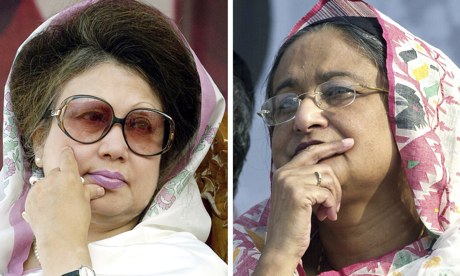Bangladesh's Battling Begums
"I called you around noon. You didn't pick up."
Bangladeshi Prime Minister Sheikh Hasina
"You have to listen to me first."
Khaleda Zia, Opposition leader

Khaleda Zia (left) and
Sheikh Hasina Wajed: the BNP has alternated in power with the Awami
League since democracy was restored in 1991. Photograph: Farjana K
Gohuly/AFP/Getty Images
So much for feminists and other bright minds holding solidarity with feminism, believing that if women ruled the world there would be no factionalism, the Sisterhood would see to that; there would be no conflict, for women are peace-makers, enablers, accommodationists, dedicated to harmony and goodwill among all people, bringing reasonable debate to issues of contention.
Another Muslim country, one with a considerable population of some 160-million people -- mostly impoverished, like the country itself -- at war with itself. Petulantly, aggressively, tribal, clan and tooth and claw. India did itself a great favour when it agreed to partition, giving Pakistan its own geography, although the relations between the two haven't forestalled wars between the two nuclear countries and terrorist attacks from Pakistan over Kashmir.
The butchery that took place between the hordes of Muslims moving into the new Pakistan geography and the Hindus eager to see them leave, and the Hindus and Sikhs leaving the new Pakistan territory and the Muslims entering it was wholesale slaughter on a gruesome scale. And that was repeated when Bangladeshis decided it was their turn to gain their ethnic community partition with Pakistan to achieve their own sovereign country.
So now that the three countries have divided themselves, all is well. Throw in Afghanistan, Iran and the 'Stans and the viral admixture of suspicion, blame, tribal hatred, religious disunity and territorial imperatives -- a guarantee of ongoing conflict of one kind or another, and the Islamist hordes intent on jihad always to the fore. In Bangladesh, however, it's a feud between two opposing ranking dynasties vying for power in their poisonous multi-generational rivalry.
Prime Minister Sheikh Hasina's Awami League party won the Monday elections. Which was replete with street fighting, a low voter turnout and the fact that the opposition Bangladesh Nationalist Party had instituted a boycott. A tactic most puzzling, since it of course guaranteed the re-election of the very party and leader that Khaleda Zia was opposing. The logic is stunning.
"The economy is declining, democracy is being weakened and Bangladesh's march toward development is faltering. The latest election and the opposition violence linked to it shows how they could not care less about the people they say they want to serve", said Hassan Shahriar, a demoralized political analyst, in Bangladesh.
Eighteen people were killed as police fired at protesters, and opposition activists torched over one hundred polling stations on Sunday during voting. Three other people were killed on Monday. Opposition activists staged attacks, strikes and transport blockades to emphasize their demands. Those demands and the issues they have raised and the attacks emanating from them have been responsible for the deaths of 300 people since last February.
Bangladesh has been ruled for almost twenty-two years by either of these ruthlessly opposing women from powerful political families and opposing political parties. Ms. Hasina, the daughter of Bangladesh's founding leader Sheikh Mujibur Rahman, assassinated in 1975. Ms. Zia was the wife of another leader, military ruler Ziaur Rahman, who was assassinated in 1981.
And while Begum Hasina has suspicions that Begum Zia helped to plot the military coup that took her father from power in 1975 and engineered the killing of most of his family, forcing her to remain in exile in India while Ms. Zia's husband was in power, Ms. Zia suspects that Ms. Hasina was involved in her husband's removal and assassination.
Labels: Bangladesh, Crisis Politics, Poverty, Social Failures, Violence

<< Home